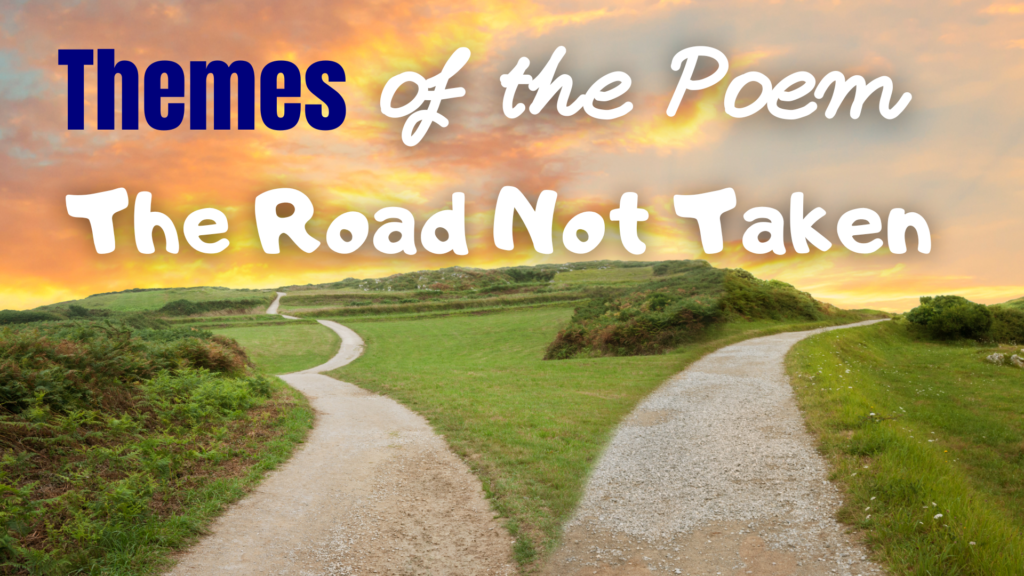Here, we have an excellent article on the Themes of The Road Not Taken by Robert Frost.

Introduction: One Decision Can Change Everything
Have you ever stood at a crossroads, wondering which direction to take? That quiet moment of uncertainty—the weight of the future pressing on a single choice—is beautifully captured in Robert Frost’s famous poem The Road Not Taken. At first glance, it seems like a simple reflection on a walk in the woods. But beneath its surface lies a treasure trove of deeper meanings. With just four stanzas, Frost delivers a powerful meditation on life, choices, individuality, and regret.
This article explores the key themes of The Road Not Taken—themes that have resonated with readers for generations. We’ll break down each theme and back it with examples from the poem, helping you see why this poem continues to hold such a meaningful place in both literature and everyday reflection.
1. Choices and Decisions
At the core of the poem is the universal experience of making a decision, especially one that seems small at the time, but shapes the course of a life.
“Two roads diverged in a yellow wood,
And sorry, I could not travel both…”
Here, Frost presents the speaker with two paths, symbolizing two different directions in life. The choice isn’t obvious; both roads appear equally worn:
“Though as for that, the passing there
Had worn them really about the same.”
This captures how life often presents us with decisions where the outcomes are uncertain, yet we must choose—and live with the consequences.
2. Individuality and Non-Conformity
Another key theme is the desire to forge your own path—to live a life that’s true to yourself, rather than following what is expected.
“I took the one less traveled by,
And that has made all the difference.”
Although the speaker admits earlier that both paths were similar, by the end, he chooses to view his decision as unique and defining. This reflects our tendency to shape our life story around the idea that we’ve taken the bold or different route, even if the difference wasn’t so clear at the time.
This theme resonates with the importance of independence, free will, and the idea of leaving your own mark on the world.
3. Regret and Reflection
Embedded in the poem is a subtle but powerful current of regret—or at least a sense of wondering “what if?”
“I shall be telling this with a sigh
Somewhere ages and ages hence…”
That “sigh” is loaded. Is it a sigh of satisfaction, nostalgia, or regret? Frost leaves it ambiguous, mirroring how we often look back on life’s turning points with mixed feelings. This theme reminds us that every choice means leaving something behind, and the path not taken will always remain a mystery.
4. Uncertainty and Ambiguity
Life rarely offers clear signs about which choice is “better.” The speaker admits that:
“And both that morning equally lay
In leaves no step had trodden black.”
This theme of uncertainty challenges the idea that we can fully control or predict the outcomes of our decisions. Often, we won’t know the significance of a choice until much later, if ever.
This reinforces the poem’s realistic, even slightly ironic tone: the roads may not have been so different after all, but we find meaning in our choices because we have to.
5. Time and Irreversibility
One of the more poignant themes is the irreversibility of choices. Once a path is chosen, there’s no going back:
“Yet knowing how way leads on to way,
I doubted if I should ever come back.”
This speaks to the nature of time and progress—life moves forward, and every decision leads to another, often taking us further from the road we didn’t take. It’s a gentle reminder that every moment counts, and while we can reflect, we can’t relive.
6. The Power of Perspective
The poem also explores how we reinterpret the past. When the speaker says the choice made “all the difference,” it’s important to remember that earlier, he said the roads were “really about the same.” So did the road really make a difference?
Or does the speaker choose to give meaning to the path he took?
“I shall be telling this with a sigh…”
This suggests that our memories and stories are shaped by how we choose to view our past. It’s not always about what happened, but how we frame what happened.
Hope you enjoy our article on Themes of The Road Not Taken by Robert Frost.
Conclusion: The Road You Choose Shapes the Life You Lead
The Road Not Taken is more than a poem about a walk in the woods. It’s a rich, reflective work that holds a mirror to our own life choices. Whether you interpret it as a celebration of individuality or a meditation on missed opportunities, one thing is clear: our decisions shape us.
But Frost’s final lines aren’t just about looking back—they’re a quiet invitation to move forward with intention:
“I took the one less traveled by,
And that has made all the difference.”
We don’t always know where a choice will lead. But every decision is a step forward, a part of your story. And while we can’t walk every path, we can choose the one that feels right—and walk it with courage, awareness, and hope.
Food for Thought
What “roads” have you taken in your own life? Was there one you didn’t choose—and do you ever wonder what might’ve been?
Frost doesn’t give us answers—but he does give us something more valuable: a question that never quite leaves us.
Hope you enjoyed our article on Themes of The Road Not Taken by Robert Frost.